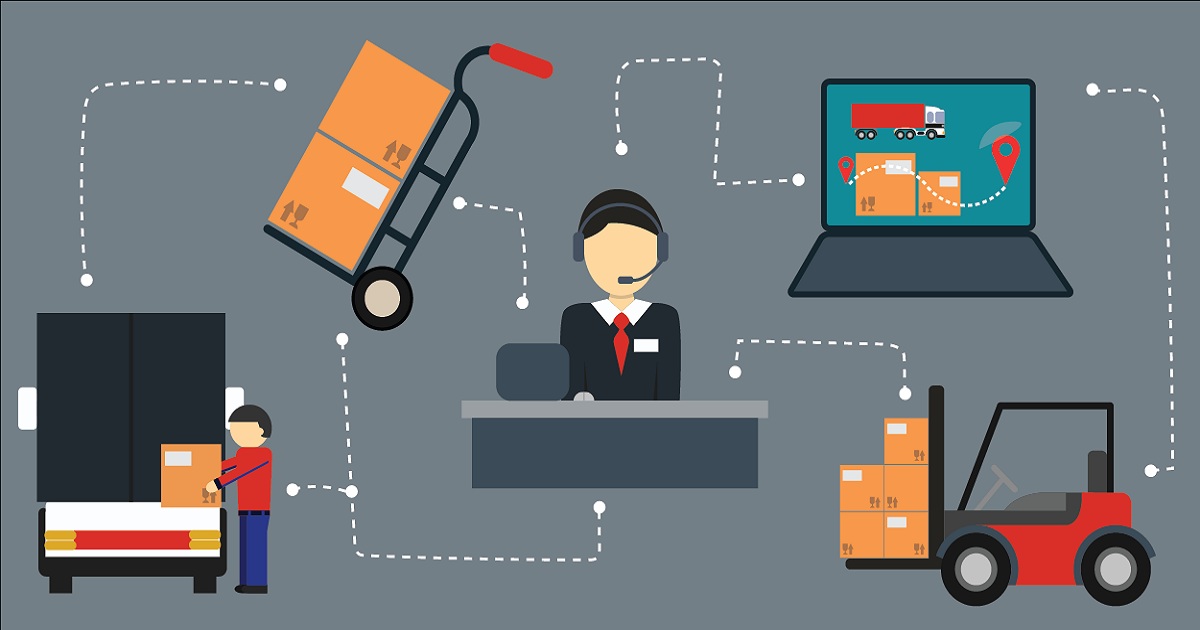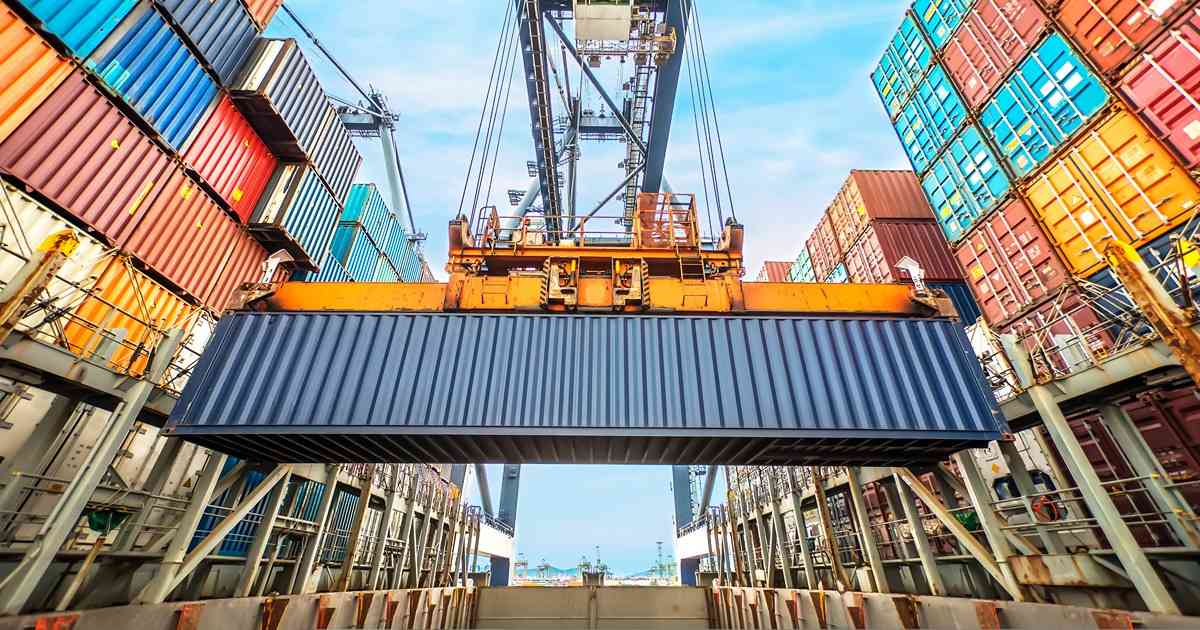
Warehousing and Distribution
Article | July 17, 2023
Transportation has always been the cornerstone of the supply chain and arguably its most targeted area when something goes wrong with a shipment. Why is my package late? What is my load’s current location? What is the ETA for my order? These are the daily questions that come from warehouses, distribution centers, and their end consumers – and they’re being asked now more than ever. Answering these questions requires holistic visibility into your supply chain that can only be achieved with the right mix of transportation technology and data management.
Read More

Warehousing and Distribution
Article | July 11, 2023
Unlock operational efficiency and deliver exceptional customer service with a WMS. Learn how cloud-based WMS improves control, enhances customer service, and prepares businesses to develop & succeed.
Contents
1. Importance of Warehouse Management Systems
2. How Warehouse Management Systems Optimize Operations
2.1. Productivity Tracking
2.2. Inventory Control
2.3. Labor Management System
2.4. Slotting
2.5. Batching Logic
3. Essential Warehouse Operations Procedures
3.1. Inbound Logistics Process
3.2. Outbound Logistics Process
5. Conclusion
1. Importance of Warehouse Management Systems
A warehouse management system (WMS) is essential for optimizing warehouse operations and delivering exceptional customer service. There are five compelling reasons to consider implementing a WMS. Firstly, it enhances inventory control and management by reducing inventory levels, improving order fulfillment, and increasing accuracy. Secondly, it improves customer service and tracking through improved picking accuracy and automated shipment organization. Thirdly, a WMS boosts company productivity by adding warehouse efficiency and quality control to the fulfillment process. Fourthly, it provides a significant return on investment by improving sales accuracy, reducing errors, providing safe warehouse and simplifying customer support. Lastly, a good WMS integrates seamlessly with existing business management systems and adapts to evolving needs. Additionally, WMS enables businesses to meet compliance regulations through real-time data recording, enhanced business intelligence, and process automation.
2. How Warehouse Management Systems Optimize Operations
2.1. Productivity Tracking
Warehouse management systems (WMS) are crucial in optimizing operations by providing comprehensive productivity tracking tools. These systems capture and analyze key performance indicators (KPIs) such as order fulfillment rates, picking accuracy, and labor productivity. Organizations can identify bottlenecks, allocate resources effectively, and implement process improvements by tracking these metrics in real-time and generating insightful reports. With WMS productivity tracking, businesses gain a clear understanding of their operational efficiency and can make data-driven decisions to enhance overall performance.
2.2. Inventory Control
Efficient inventory control is essential for logistics warehouse management, and WMS solutions excel in this aspect. WMS provides real-time visibility into inventory levels, locations, and movements. Businesses can accurately track stock levels, monitor expiration dates, and implement automated replenishment warehouse processes. With advanced features like cycle counting and stock level alerts, WMS ensures inventory accuracy and reduces carrying costs. By optimizing inventory control, businesses can avoid stockouts, minimize excess stock, and improve order fulfillment rates, enhancing customer satisfaction.
2.3. Labor Management System
WMS incorporates a robust labor management system that enables businesses to allocate and manage their workforce effectively. These systems provide tools for labor planning, task allocation, and performance tracking. WMS optimizes labor allocation by assigning tasks based on employee skills, availability, and workload. By monitoring labor productivity and efficiency, businesses can identify opportunities for improvement and implement training programs to enhance employee
performance. With WMS labor management capabilities, organizations optimize labor costs, minimize overtime, and improve overall operational efficiency.
2.4. Slotting
Strategic slotting is a critical component of warehouse optimization, and WMS offers advanced slotting capabilities. By analyzing data on product demand, turnover rates, and order frequency, WMS determines the optimal locations for different products within the warehouse. Efficient slotting reduces travel time, minimizes congestion, and streamlines order picking. WMS enables businesses to assign appropriate storage locations based on product size, weight, and velocity. By optimizing slotting strategies, organizations can significantly enhance picking efficiency, reduce errors, and improve overall warehouse productivity.
2.5. Batching Logic
Batching logic is a key feature of WMS that enhances order-picking efficiency. WMS intelligently groups multiple orders with similar product requirements, locations, or delivery routes. By consolidating these orders into batches, the system enables batch picking, where a picker can fulfill multiple orders in a single trip through the warehouse. Batching logic reduces travel time, minimizes labor costs, and increases order picking speed. By maximizing picking efficiency, businesses can improve order fulfillment rates, reduce order cycle time, and meet customer expectations effectively.
3. Essential Warehouse Operations Procedures
A robust distribution center network serves as the backbone of operations, transforming raw materials into finished products and ensuring their timely delivery to customers. To gain a comprehensive view of logistics network and improve supply chain visibility, it's crucial to understand the distinction between inbound and outbound logistics.
3.1. Inbound Logistics Process
Inbound logistics encompasses the services required to bring materials and goods into businesses. This includes transportation, storage, and delivery processes. With the help of warehouse management systems (WMS), purchasing can be streamlined by synchronizing vendor details and inventory control levels. WMS allows efficient receipt scanning and guides warehouse staff to shelve items accurately. It also recommends optimal put-away, slotting, and storage space utilization techniques. Additionally, WMS facilitates reverse logistics by providing real-time information on product availability, enabling timely restocking and preventing stockouts.
3.2. Outbound Logistics Process
Outbound logistics focuses on the storage, transportation, and delivery systems that ensures finished products reach their final destination. WMS plays a vital role in this process as well. It enables accurate order picking through barcode or RFID scanners, reducing errors and ensuring the right products are chosen. Warehouse management processes integrated with WMS can automate product packaging, allowing for differentiation across sizes and optimizing packaging channels. Moreover, WMS simplifies printing shipping labels, price tags, logos, and other necessary documentation, eliminating manual data input and reducing human errors. WMS enhances the overall customer experience and minimizes fulfillment errors by ensuring timely delivery and notifying customers.
4. Implementing Cloud Warehouse Management Systems to improve productivity
Using a cloud-based warehouse management system offers several advantages for businesses looking to optimize their inventory control and streamline operations in complex distribution environments. Cloud supply chain management solutions provide benefits like multi-warehouse tracking, sales forecasting, and on-time delivery. Here are three key benefits of implementing a cloud WMS:
Increased control over business growth: Cloud-based WMS provides real-time visibility into inventory, allowing businesses to manage operations and make informed decisions efficiently. With automatic updates and centralized access, stakeholders can access relevant information anytime, enabling better control over business growth and flexibility to adapt to changing market demands.
Improved customer service: A cloud WMS empowers teams to track shipments, update arrival dates, and effectively manage the supply chain. It enables seamless communication and collaboration across the organization, ensuring timely deliveries and enhancing customer satisfaction. Efficiently conveying information leads to better customer service and a competitive edge.
Preparedness for upcoming changes: Cloud WMS offers an affordable and scalable warehousing solution. With cloud computing, businesses can easily adjust resources to meet fluctuating demands and seasonal changes. The ‘self-service’ access to WMS applications in the cloud allows for increased agility and quick adaptation to evolving business needs. Unlike traditional self-hosted systems, cloud WMS eliminates the need for upfront hardware investments and provides seamless scalability.
5. Conclusion
In the rapidly evolving business landscape, a warehouse management system (WMS) holds immense importance for organizations aiming to optimize their operations. As we look to the future, the role of WMS becomes even more crucial. With advancements in technology and the advent of new platforms, a cloud-based WMS offers unparalleled integration possibilities. By harnessing the power of cloud supply chain planning systems, businesses can gain better control over their inventory and navigate the complexities of modern distribution environments. The benefits are significant: increased control over business growth, improved customer service through real-time tracking, and preparedness for upcoming changes. By embracing cloud, WMS empowers businesses to stay agile, enhance productivity, and drive sustainable success in the dynamic business landscape of the future.
Read More

Transportation
Article | April 26, 2023
Leveraging technology and resources within a network is key to supply chain optimization. While supply chains are inherently complex, this complexity can lead to significant technological benefits.
Contents
1 Overview and Importance of Emerging Technologies in Optimizing Supply Chain
2 Advantages of Incorporating Emerging Technologies in Enhancing Optimization
2.1 Autonomous Delivery
2.2 Cognitive Automation
2.3 Blockchain-enabled Traceability
2.4 Predictive Maintenance
3 Key Challenges in Adopting Emerging Technologies
3.1 Cost and Budget Constraints
3.2 Skills Gap in Talent
3.3 Privacy and Data Security Concerns
4 Overcoming Challenges
4.1 Adopting Technologies for Managing Budget and Cost
4.2 Developing Talent Pipeline
4.3 Implementing a Zero Trust Security Model
5 Future Outlook
Supply chain optimization involves maximizing the utilization of technology and resources within a supply network. Although supply chains are inherently complex, this complexity can yield significant technological advantages, particularly when leveraging the combination of blockchain, artificial intelligence (AI), and Internet of Things (IoT) technologies.
1 Overview and Importance of Emerging Technologies in Optimizing Supply Chain
Emerging technologies have transformed the supply chain industry and revolutionized business operations. AI, IoT, blockchain, and robotics are getting prominence with the ability to streamline supply chain processes, reduce costs, increase efficiency, and ultimately boost customer satisfaction. Implementing these technologies can give businesses real-time supply chain visibility, reducing waste and enhancing inventory management. Understanding the potential benefits of these emerging digital supply chain technologies and how they can be implemented within the supply chain is essential for any business that intends to stay in a competitive and rapidly evolving market.
2 Advantages of Incorporating Emerging Technologies in Enhancing Optimization
Blending operations with emerging supply chain technologies can significantly improve the speed and accuracy of information flow, minimize manual intervention, and reduce lead times. Additionally, these technologies can provide enhanced visibility into supply chain operations, enable effective risk management, and facilitate proactive decision-making.
2.1 Autonomous Delivery
Incorporating autonomous delivery that comes with self-driving vehicles benefits businesses beyond faster delivery times, lowers costs and reduces human error. It offers increased safety, greater flexibility, and improved resource management. It benefits industries like e-commerce and logistics, where quick and efficient delivery is crucial.
2.2 Cognitive Automation
Businesses face significant challenges due to unpredictable fluctuations in supply and demand, which can strain their existing technology. To mitigate these risks, executives have increased their investments in risk management. Cognitive automation offers three key benefits in supply chain management: identifying challenges and opportunities, gathering demand signals, and utilizing data for decision-making. Cognitive automation makes balancing supply and demands more efficient and effective, allowing businesses to act faster.
2.3 Blockchain-enabled Traceability
Blockchain technology, a distributed ledger system, enables secure, transparent, and traceable record-keeping across a supply chain network. By providing a tamper-proof record of product movement and quality, blockchain technology can enable businesses to verify the authenticity and integrity of their products at each stage of the supply chain. In addition, blockchain technology allows businesses to quickly trace product origins and identify affected batches during recalls.
2.4 Predictive Maintenance
Predictive maintenance is a technology that uses machine learning algorithms and Internet of Things sensors to predict impending equipment failures. By analyzing equipment performance data, predictive analytics enables businesses to reduce equipment downtime, lower maintenance costs, and increase reliability. With predictive maintenance, businesses can transition from reactive to proactive maintenance, preventing equipment failures and extending equipment lifecycles.
3 3 Key Challenges in Adopting Emerging Technologies
3.1 Cost and Budget Constraints
The executives in the supply chain industry face a significant challenge when adopting emerging supply chain technologies due to the associated costs and budget constraints. While these smart supply chain technologies offer long-term benefits, the upfront investment can deter businesses. Businesses need to consider the total cost of ownership, including implementation, training, ongoing maintenance costs, and the potential return on investment.
3.2 Skills Gap in Talent
Incorporating emerging technologies and trends in supply chain operations management is a complex and costly investment that demands a highly skilled workforce to implement and operate such supply chain technologies successfully. A significant skills gap while adopting technology in the supply chain industry poses a challenge for businesses in finding and training competent personnel with technical, analytical, and business skills required to handle emerging technologies.
3.3 Privacy and Data Security Concerns
As supply chain operations adopt cutting-edge technologies, companies must address privacy and data security issues. The use of technology requires the collection and dissemination of sensitive data across multiple parties, which raises security and privacy concerns that can be exploited by cybercriminals or unauthorized personnel. Failure to adequately address these issues may result in reputational harm, legal and financial penalties, and a loss of customer confidence.
4 Overcoming the Challenges
4.1 Adopting Technologies for Managing Budget and Cost
To overcome the challenge of budget and cost constraints in adopting technology in the supply chain, businesses can leverage innovative tools, such as cost management software and advanced analytics tools, which can provide real-time visibility into cost drivers and enable better decision-making to optimize resource utilization. With the top three technologies in supply chain such as AI, IoT and blockchain, businesses can reduce costs, boost supply chain performance, and maintain market competitiveness. AI predicts demand, maximizes inventory and improves transportation; RPA automates manual tasks, reduces labor costs, and cloud computing provides a flexible and scalable IT infrastructure with reduced upfront investments.
4.2 Developing Talent Pipeline
Businesses must invest in building a talent pipeline to ensure a steady supply of skilled employees to narrow the skills gap in the supply chain industry. Collaboration with educational institutions, in-house training programs, and managed service providers from the technology industry can all be part of the answer. The organization's competitiveness and success can be increased by creating a talent pipeline to fill the skills gap between the current workforce and the needs of emerging technologies. Businesses can keep their workforce current and ready to adopt new technologies in supply chain by investing in a talent pipeline.
4.3 Implementing a Zero Trust Security Model
As businesses adopt emerging technologies for supply chain operations, privacy, and data security, concerns have become a formidable obstacle. The implementation of a zero-trust security model can aid in addressing this difficulty. Before gaining access to any data or system, all users and devices in this model must be authenticated as potential threats, per this model. This strategy protects data and systems from unauthorized access and enables businesses to comply with regulations such as the GDPR and CCPA. In addition, it can provide supply chain visibility and control over data access in real-time, making it more effortless to detect and respond to security threats.
5 Future Outlook
Supply chain leaders view emerging supply chain technology as a competitive advantage and as a means to address digital transformation. In addition, there is a focus on supply chain technologies that improve human decision-making and manage assets at the edge. Organizations should unify their technology portfolio and update legacy systems for greater efficiency. As supply chain complexity increases, we can expect even more advanced technology solutions leveraging big data, machine learning, and robotics to create agile, flexible, and sustainable supply chains.
Read More

Software and Technology, Logistics
Article | July 8, 2022
Introduction
From warehouse robots to delivery drones, the supply chain is experiencing a tremendous upheaval. AI promises a totally autonomous and self-organized future supply chain. A fleet of vehicles utilizing a swarm algorithm can enhance cargo yard throughput; a trusted peer-to-peer ledger on blockchain architecture could change compliance in the sector; and wearables, mobile robotics, and machine learning technologies could speed up order fulfilment. IOT e-brokerage solutions can link shops to couriers and transporters with a click. Tomorrow's supply chain will be leaner, quicker, and self-organized. A few innovative technologies will fuel this unparalleled rate of change over the next 15 years. Here are the major technologies that are shaping the future of the logistics industry.
Logistics Technologies for the Future
Shipment Tracking Systems
Previously, customers ordered shipments, had an anticipated arrival date, and then were kept in the dark until they chose to call. Customers can now access shipping and tracking systems around-the-clock due to developments in the internet and software. This not only enhances the customer experience (cx), but it also saves the business time and money.
Internet of Things (IoT)
The IoT reduces costs and delays by minimizing hazards in the supply chain. Cabs, cargo ships, trains, etc., have sensors that link to an alarm system or dispatcher. These sensors analyze and communicate information to the crew, who learns about hidden threats. IoT isn't a new technology, but it continues to influence logistics by improving in-transit visibility and delivery.
Radio Frequency Identification (RFID)
RFID technology has been used for a few years to monitor inventories labor-efficiently. A product tag or sensor produces radio waves. The company processes the data. RFID tags are similar to barcodes, but their faster information transport and data processing appeal to companies and the direction of technology. Many organizations use RFID tags to track containers in warehouses.
Enhanced GPS Accuracy
Almost everyone utilizes GPS on their vehicles or smartphones. These devices' accuracy has improved over time, assisting lost drivers and enhancing the supply chain. By monitoring truck locations and boosting hauls with current traffic data, GPS increases efficiency and customer satisfaction.
Closing Lines
Unprecedented times have produced unprecedented transformations that will last for generations. Changing demographics, technology improvements, and COVID-19 impacts are altering global supply networks. We must understand the driving factors and act on what we learn to adapt and rise to the situation. For the sake of our current workforce and future generations.
Read More